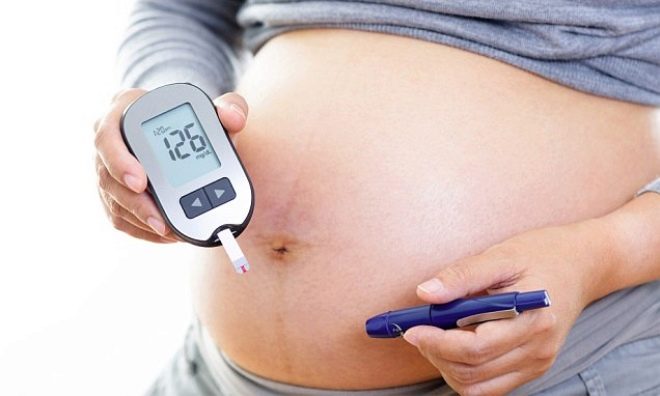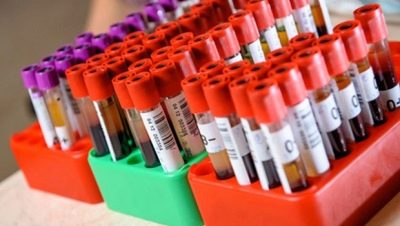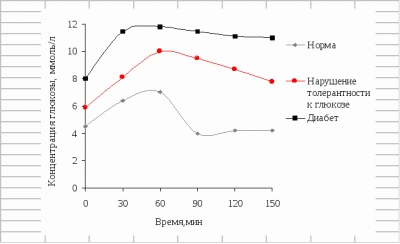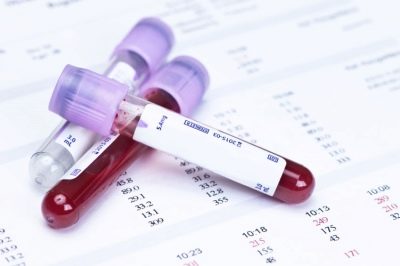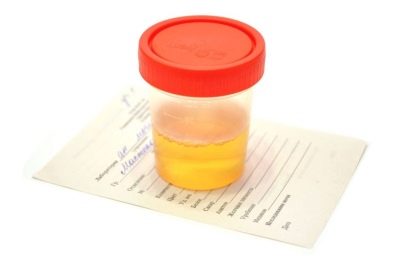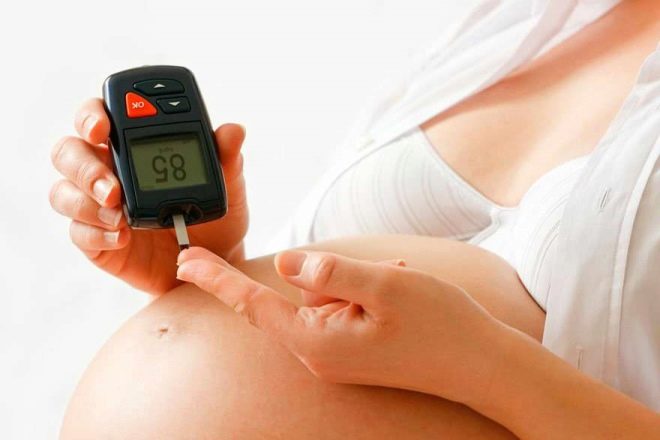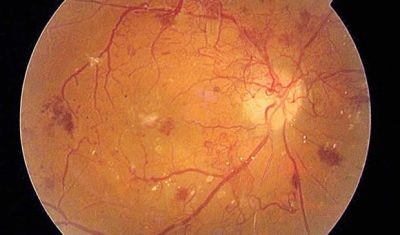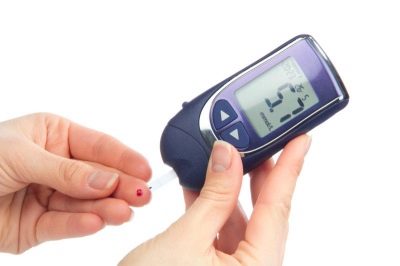Analysis of blood glucose in pregnant women: norms and causes of deviations
Maintaining an optimal sugar concentration during the period of carrying a baby is very important. This is necessary for active growth and full development of the fetus. In order to determine the level of sugar in the blood of the future mom, and apply blood tests.
About glucose in the blood during childbirth
Constancy of sugar in the body is maintained with the help of quite a few hormones. The base of these is insulin. It is produced by special cells of the pancreas. Insulin is a special conductor that conducts glucose to all cells of internal organs. The brain and the baby's heart are most in need of this nutrient.
Glucose metabolism occurs in muscle cells. This process involves a lot of different enzymes. Excess sugar is further processed into fat and deposited in fat cells. This leads to an expectant mother with carbohydrate metabolism problems has an overweight problem.
Actively growing fruit requires a lot of nutrients for its development. This physiological response is most pronounced in the third trimester of pregnancy.
Also, the need for nutrients and especially for glucose increases significantly during multiple pregnancies.
Causes of deviations
Currently, scientists have established the cause that underlies the metabolic disorders of carbohydrate metabolism during pregnancy. It lies in the fact that in future moms hormonal changes significantly.
Progesterone, placental lactogen and human chorionic gonadotropin cause the woman to develop insulin resistance.
Peak concentrations of these hormones increases by 14-15 weeks of pregnancy. This condition leads to the fact that insulin can not have a full effect on glucose metabolism. Ultimately, this contributes to the fact that the blood sugar level remains fairly high.
Doctors note that a hereditary factor plays a huge role in the development of severe hyperglycemia or a persistent increase in blood glucose levels.
It is scientifically noted that future mothers who have a burdened family history of diabetes have a higher chance of developing this pathology during pregnancy. If a woman during a previous birth gave birth to a baby weighing more than 4 kg, then this can also be a possible sign of the gestational form of this pathology.
Who is assigned to this study?
To determine the indicators of blood sugar should be in each trimester of pregnancy. Such a diagnosis is now becoming extremely necessary. It is important to note that Every year, the incidence of diabetes in a population grows dramatically. This frightening situation has contributed to the fact that doctors are paying great attention to research on the determination of glucose, conducted by all pregnant women.
Experts identify several special risk groups. These population categories include women who have quite a few chances of developing hyperglycemia during pregnancy. These risk groups include:
- future mothers over 35 who have sugar jumps before pregnancy;
- pregnant women who are obese or have an increased body mass index (BMI) in excess of 25;
- future mothers with a burdened hereditary history of the development of diabetes mellitus in close relatives;
- pregnant women who had impaired glucose tolerance before conceiving a child;
- future mothers who, before conceiving a baby, had undergone a course of hormonal therapy or special treatment for infertility.
A blood glucose test is conducted for all pregnant women, regardless of their age.
Doctors recommend future moms to undergo an analysis to determine blood sugar at least twice during the entire period of pregnancy. Typically, such studies are assigned to 9-12 and after 31 weeks of pregnancy.
What situations helps prevent?
Regular monitoring of blood glucose levels is necessary. It helps prevent quite dangerous conditions. Some of them may even be life-threatening for the fetus.
Obstetricians and gynecologists note that the control of blood glucose levels helps to significantly reduce the risk of spontaneous miscarriage. It also reduces the likelihood of preterm labor.
Doctors say that timely detection of hyperglycemia in the mother helps to reduce the number of congenital malformations her baby, which occurs mainly in the first half of pregnancy during the laying of all vital organ systems.
A normal blood glucose level helps the fetus optimally grow and develop. Such babies are born healthy and have a normal body weight. In women with persistent hyperglycemia during pregnancy, in most cases babies are born with signs of obesity. As a rule, the average weight of a child in this situation is 4 kg or more.
The timely detection of persistent increases in blood sugar can reduce the risk of preeclampsia and severe hypertension, which can significantly aggravate the course of pregnancy.
Timely correction of these violations reduces the development of dangerous complications of diabetes.
Symptoms of deviations
Elevated level
Persistent hyperglycemia can cause a whole range of various disorders. They lead to the development of uncomfortable symptoms in the future mom, worsening her usual well-being.
Increased blood sugar contributes to the emergence of strong thirst and dry mouth. Such a symptom causes the woman to begin to consume quite a lot of fluid. In some cases, she drinks 5-6 liters of water per day.
Frequent drinking leads to the fact that the expectant mother puffiness appears. It usually appears on the legs. Ankles become swollen. A woman notes that it becomes difficult for her to fasten her boots or other shoes. When wearing socks on the ankles appear strong traces of them.
The large use of water contributes to the appearance of frequent urination. Portions of urine become large in volume. The clinical indicators of the analyzes vary. So, the specific gravity and density of urine may decrease. Its color also changes - it becomes more pale.
Future mothers suffering from persistent hyperglycemia, begin to complain about the appearance of their headaches. Usually it is of moderate intensity and increases in the evening.
A pregnant woman often feels very tired, even if she has not done any intense exercise. Some expectant mothers appear dizzy, noticeably aggravated when the body position changes.
A strong increase in blood sugar leads to the fact that women’s hands and feet become very cold. Some note a decrease in vision. Severe hyperglycemia can also be a mood disorder.
A woman becomes more aggressive, her attention is scattered, it is difficult for her to concentrate even on simple, ordinary things.
Reduced level
The lower blood glucose concentration is called hypoglycemia by doctors. This condition occurs during pregnancy more rarely. Chronic pathologies of the gastrointestinal tract and pancreas can lead to its development.
Expectant mothers with a lack of body weight and limiting their nutrition before pregnancy are also may be in the zone of increased risk for the development of this state.
To suspect moderate hypoglycemia is quite difficult. It almost does not manifest itself. Only with a significant decrease in sugar, a woman may experience severe weakness and excessive fatigue. In some women, drowsiness is rapidly increasing.
Critical decrease in blood sugar is an extremely undesirable pathology, as it very dangerous for the fetus. It can lead to acute nutritional deficiencies necessary for its development.
The extreme severity of hypoglycemia is coma. With this pathology, the woman loses consciousness. In this situation, emergency hospitalization of her in hospital and intensive care with intravenous infusion of glucose solutions are required.
How to prepare for delivery?
It’s still necessary to prepare before performing the study, even though the blood glucose test is rather commonplace and routine.
Abuse on the eve of the delivery of this laboratory test candy or chocolate can lead to an excessive jump in the level of sugar. In this case, hyperglycemia will not be a sign of diabetes, but it will still be detected.
2-3 days before the study, doctors strongly recommend expectant moms eliminate any psycho-emotional stress. Scientists have found that such effects lead to a strong increase in blood sugar levels.
To worry and be nervous before going to the laboratory is not worth it. This is quite a common procedure, which is carried out to all expectant mothers, without exception.
Limiting physical exertion is also an important condition before passing tests. Intensive exercise can lead to blood glucose being lowered.
Low rates of sugar can be even after the usual cleaning of the apartment or visiting the yoga class for pregnant women. 2-3 days before the test is better exclude any visits to the sports center, to reduce the risk of spontaneous hypoglycemia.
Compliance with a special diet before the study is not required. On the contrary, in order to get a more reliable result, doctors recommend pregnant women to observe their usual way of nutrition. The only restriction is the reduction of sugar-containing products, especially rich in “fast” carbohydrates.
On the eve of the analysis should be eaten as easily as possible. It is better to give preference to protein foods with vegetable garnish. Fatty and fried foods should be excluded, as this may adversely affect the reliability of the results. Basically, such restrictions are necessary if blood is taken for analysis through a vein.
How is it done?
Hand over the analysis should be on an empty stomach. Do it better in the morning. You can drink some water before testing. It should be noted that you can not drink sweet drinks in the morning before the analysis. They can lead to a jump in sugar, which is determined during the study.
The day before the test, doctors recommend limit the use of any sweets. The ban is primarily "fast" carbohydrates. These include any industrial sweets, chocolate, bananas, dried fruit and grapes. "Slow" carbohydrates contained in cereals and various cereals, it is not necessary to limit.
Delivery of the analysis is allowed by several methods. Currently, more and more laboratories are performing blood sampling from a vein. In this case, the study is absolutely painless and does not cause any discomfort for the woman. Intravenous studies are conducted in almost all private laboratories.
An alternative method of research involves the taking of blood from a finger. Her doctors call it capillary. This method of blood collection is gradually being replaced by the intravenous method. He is more traumatic and worse tolerated.
Sugar level in venous and capillary blood varies. Reference values are always indicated on medical forms with the result of the analysis. The interpretation of the result is performed by the therapist or endocrinologist.
With an increase in blood glucose on an empty stomach, the expectant mother will be recommended a number of additional tests. This is necessary in order to confirm or disprove the diagnosis of gestational diabetes mellitus, as well as timely identify glucose tolerance.
Related tests
The baseline study prescribed to determine the level of sugar in the blood is the blood glucose test. If the indicators of this laboratory test are within the normal range, then in such a situation only mandatory monitoring of this indicator is required in the next trimesters of pregnancy.
Deviations from normal values - a reason for conducting more advanced research. One of these lab tests is determining the level of sugar after a sugar load. Also, this method is called glucose tolerance.
For this, a sugar curve is constructed. It shows the change in blood sugar after the introduction of 75 grams of oral sweet solution for three hours. Evaluation of the obtained values is carried out by the endocrinologist. This study helps to determine gestational diabetes and other pathologies of carbohydrate metabolism.
American scientists have found that this pathology occurs in 20% of women in the second half of pregnancy.
Obstetricians and gynecologists recommend taking this test to expectant mothers from 24 to 28 weeks of intrauterine development of the fetus. According to statistics, it is at this time that the risk of gestational diabetes is as high as possible.
Some women believe that they can carry out this study on their own, without going to a medical institution. To do this, they replace the oral sugar solution with a certain carbohydrate intake. The result is evaluated one hour after the meal. Doctors say that it is impossible to carry out such a study independently. This self-test will not provide accurate and reliable results.
You can perform tests with oral glucose only in a polyclinic or hospital settingwhen a woman is watched by experts. Such a study will be informative and will not harm the fetus.
Glycated hemoglobin is another clinical indicator that allows to establish hyperglycemia. The advantage of this test is that it allows you to determine the average plasma glucose concentration in 2-3 months.
To determine this indicator, venous blood is collected. The readiness of the result, as a rule, is several hours or 1-2 working days.
This study is necessarily assigned to all future moms who have doctors suspect gestational diabetes. Under new standards, its normal values should be less than 6%. With controlled diabetes, this figure does not exceed 6.5%.
With a high concentration of glucose in the blood, it can also be detected in the urine. This is manifested when hyperglycemia is above 9 mmol / l.In this case, a general urine test is prescribed. He surrenders by the general rules.
It should be noted that deliver urine should be within two hours from the time of its collection. If this is not possible, then you can store the biomaterial in the refrigerator for up to 6-8 hours. However, it is worth noting that in this case the results may be less reliable.
These studies can be carried out in a regular clinic, and in a private laboratory.
If the analysis is performed according to the OMS policy, then before going to the hospital you should definitely take a medical direction with you. This special medical form is issued to the expectant mother by the doctor at the reception. It indicates the main personal data of the patient, her expected gestational age, and also makes special notes for laboratory technicians if necessary.
All tests carried out under the OMS policy are carried out in the clinic absolutely free. Also, such tests future mother can pass in a private laboratory. The cost of analysis in this case varies considerably. The price for the blood glucose test in most private medical laboratories is 300-400 rubles with blood sampling.
Glucose toxicity test will cost a little more. Its cost is usually 800-1000 rubles. It is important to remember that this study is conducted within two to three hours.
All this time, the future mother is better located within the walls of a medical facility. In the private laboratory facilities are created for this. The future mommy can read a book or watch TV between successive blood samples.
Standards of performance
The rate of blood sugar in pregnant women is almost the same as before pregnancy. What is important is which method determines the values. Thus, the normal values of capillary and venous blood may be slightly different.
Blood sugar during the entire period of pregnancy should remain within the normal range. Deviations from normal values should always be an indication for additional diagnostics.
For the convenience of determining the pathologies of carbohydrate metabolism, doctors use a special table that contains the boundaries of normal blood sugar levels in pregnant women. This form is presented below:
Fasting Glucose Rate (mmol / L) | 3,3-5,5 |
1 hour after sugar load (mmol / l) | Less than 10.5 |
2 hours after sugar load (mmol / l) | Less than 9.2 |
3 hours after sugar load (mmol / l) | Less than 8.0 |
What do the results show?
Normal values obtained after the test, are evidence of a healthy pregnancy. In this case, gestational diabetes is not detected. However, women who are at high risk for the development of this pathology should remember that they should conduct such tests more often.
To do this, it is not necessary to do a glucose-testing test. An ordinary blood glucose test is also suitable. Well, if your home is a blood glucose meter. This special device determines the performance of sugar in the peripheral blood flow in a few seconds. It is easy to use and helps to carry out the simplest diagnosis at home.
If the indicator of glucose analysis, determined on an empty stomach, turned out to be elevated, it is necessary to conduct a test with sugar load. It is worth remembering that this study has a number of contraindications for its implementation. In the last weeks of pregnancy, it is usually not carried out. Also, this study may be contraindicated if a woman has signs of a viral or bacterial infection that is acute.
Excess glucose tolerance test and glycated hemoglobin - indications for the diagnosis of gestational diabetes. If such a pathology to a pregnant woman is still established, then she is sent for mandatory consultation to an endocrinologist.
This specialist will select the necessary treatment regimen for her and also develop a special complex of therapeutic nutrition. A future mother will have to follow this diet throughout pregnancy.
Danger of high blood sugar to the fetus
Hyperglycemia
This is a very dangerous condition for the fetus. At all stages of its prenatal development, an increase in glucose in the bloodstream leads to the development of multiple pathologies. They can appear in the first and subsequent trimesters of pregnancy.
Angiopathy
This is a pathological condition that develops with prolonged hyperglycemia in the maternal organism. This pathology is characterized by impaired intake of nutrients to the baby developing in the womb.
Angiopathy causes damage to the inner wall of the blood vessels that feed the fetus. This pathology leads to the impossibility of adequate blood circulation through the blood flow system common to the mother.
Nephropathy
This is a pathological condition characterized by damage to the kidney tissue. It occurs in the event that blood sugar significantly exceeds the norm for a long period of time.
In some cases, nephropathy can lead to the development of a very dangerous condition - renal failure. As a rule, this pathology is accompanied by the appearance of glucose in the urine.
Retinopathy
This is a pathology that can develop both in a woman and in her baby at the stage of his pre-natal development. Most often, it is registered in pregnant women suffering from diabetes before pregnancy or receiving insulin therapy.
The danger of this pathology is that may lead to the development of blindness.
Neuropathy
This is a pathology of the nerves, quite often recorded in women suffering from persistent hyperglycemia or gestational diabetes. It manifests a feeling of "crawling" goose bumps.
Hands and feet are constantly cold to the touch, very cold. Neuropathy is dangerous for the fetus the development of multiple pathologies in the work of his nervous system.
Big weight
Persistent hyperglycemia can lead to too active growth of the fetus, which contributes to a significant increase in its body weight. This condition develops due to pronounced obesity, which occurs as a result of violations of carbohydrate and fat metabolism.
Too large mass of the fetus with a narrow pelvis of the mother - this is usually indication for cesarean section.
Respiratory distress
This syndrome occurs in children whose mothers suffered from diabetes mellitus during pregnancy. This pathology can lead to the development of marked respiratory disorders and persistent oxygen starvation of internal organs.
The birth of such babies is complicated by the fact that they cannot breathe on their own. In this case, may require intensive care and even resuscitation.
What to do with deviations?
When any violations of carbohydrate metabolism identified during the glucose tests appear, the expectant mother is sent for a consultation to a specialist. Endocrinologists are engaged in the treatment of such pathologies.
These specialists make up all the necessary complex of treatment, which necessarily includes therapeutic nutrition. In some cases, prescribed drugs, before the appointment of which The risk of their influence on the fetus is always evaluated.
For the purpose of choosing the means that have a minimal effect on the developing baby in the maternal abdomen.
In the first trimester of pregnancy, whenever possible, doctors try to limit themselves to prescribing a special diet. This period is very important for the fetus. It is at this time that all its vital organs are laid down.
A hypocarbohydrate diet is slightly different during pregnancy. The main difference is the calorie and nutritional value of foods. Also in the daily menu of the future mother are all protein foods and cereals, as they are needed for the full growth and development of her baby.
To maintain an optimal blood glucose level, it is very important to limit “fast” carbohydrates. Strict restrictions are imposed on industrially made sweets, chocolate, and also too sweet fruit. These include bananas and grapes. The remaining fruits in the daily menu of expectant mothers remain. However, the possible amount of their use is strictly determined.
Cereals from the nutrition of future mothers are not excluded. They are rich in "slow" carbohydrates, which do not give jumps of sugar in the blood and do not lead to the development of sudden hyperglycemia. Also, these products are rich in vitamins necessary for the full development of the nervous tissue of the fetus.
Grain can be added to the main protein dish. Expectant mothers suffering from gestational diabetes, doctors are allowed to use cereals made from buckwheat, oatmeal or rice.
In cases of severe hyperglycemia, insulin therapy may be indicated. Drugs in this case are selected individually.
Insulin dosage is very important. In the appointment of insulin necessarily monitoring the effectiveness of the selected dose. All pregnant women who have been prescribed insulin therapy, It is very important to have a blood glucose meter at home for self-checking of blood sugar.
Many women make a very dangerous mistake, starting to use various biologically active food supplements with high blood sugar. Such funds can have a very adverse effect on the fetus and during pregnancy in general.
Some of these drugs contain ingredients that may increase allergic reactions. It is important to remember that taking any medications during pregnancy must be coordinated with your doctor.
Optimum physical activities - A very important principle in the treatment of hyperglycemia. During pregnancy, it is better to give up on intensive sports. Such loads can lead to the formation of dangerous pathologies for the fetus.
For active growth and development of the baby walks in the fresh air at a moderate pace are perfect.
In the third trimester of pregnancy, if possible, limit the climb to several stairways.
Compliance with drinking regime - Also a very important principle in the normalization of blood sugar levels. It is better to drink ordinary water. This drink does not contain additional carbohydrates, which can lead to the development of hyperglycemia. During pregnancy, experts recommend drinking water at room temperature.
Eliminating stress will help maintain optimal blood sugar levels throughout pregnancy.
Expectant mothers should always remember that excitement and excessive experience over trifles can lead to serious disturbances in their metabolic processes. Pregnancy is a time when a woman should think not only about her health, but also about the future of her baby. Calm mom - the key to good growth and development of her baby.
About what should be the level of glucose in the blood during pregnancy, see the next video.

